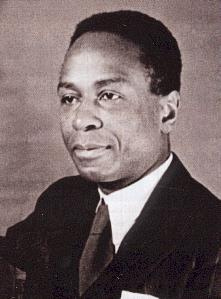A journalist, radical activist, and theoretician, George Padmore did more than perhaps any other single individual to shape the theory and discourse of Pan-African anti-imperialism in the first half of the twentieth century.
Born Malcolm Nurse in Trinidad in 1901, Padmore moved to the United States in 1925 to study at Fisk and Howard Universities. In 1928 he dropped out of Howard’s law school and joined the American Communist Party. Quickly rising in Party ranks as an expert on race and imperialism, Padmore moved to Moscow, USSR in 1929 to head the Comintern’s International Trade Union Committee of Negro Workers and to edit the Negro Worker. In 1931 he published the influential pamphlet, The Life and Struggles of Negro Toilers. In 1933 the Comintern suspended publication of the Negro Worker and disbanded the Trade Union Committee of Negro Workers, prompting Padmore to split acrimoniously with the Party. In subsequent years Padmore would become a fervent anti-Communist, denouncing the Comintern’s alleged manipulation of black freedom struggles in his 1956 book Pan-Africanism or Communism? However, throughout his life he continued to unite with activists and trade unionists on the radical left around the issue of anti-colonialism.
Padmore settled in London, UK in 1936. There he helped foster a radical milieu of Pan-Africanist intellectuals that included Padmore’s childhood friend, the Trotskyist theorist C.L.R. James. In 1936 Padmore published How Britain Rules Africa, followed a year later by Africa and World Peace. Along with I.T.A. Wallace-Johnson, Padmore and James founded the International African Service Bureau in 1937. Padmore guided the bureau through the late 1930s and early 1940s until in merged into the Pan-African Federation in 1944. He was a principal organizer of the Manchester Pan-African Congress in 1945, which helped lay the foundation for postwar African colonial liberation movements. Throughout this period Padmore’s articles and essays were printed regularly in the Chicago Defender, the Pittsburgh Courier, and The Crisis, as well as in newspapers throughout Britain, West Africa, and the Caribbean. Padmore’s international journalism and other writings linked African American struggles with liberation movements in Africa and with African Diaspora peoples around the world and thus had a profound effect on the contours of black political thought.
George Padmore spent his final years in newly independent Ghana as an advisor and mentor to Prime Minister Kwame Nkrumah. He died in London in 1959.

